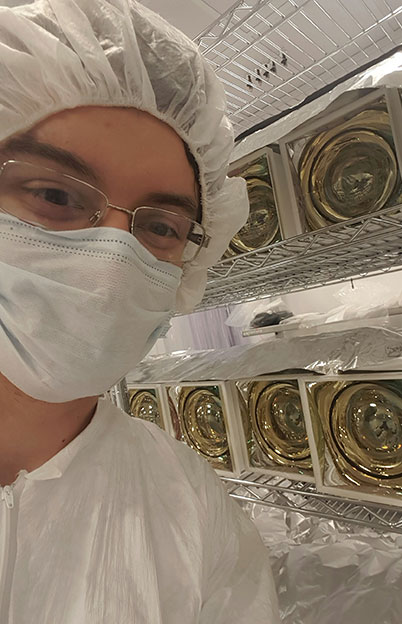
Please tell us a little about yourself.
I am a soon to be fifth year undergraduate physics major who has been working in neutrino physics research. I study computer science for my minor, and I am also a part of Drexel’s Honors Program. Currently, I am a software developer for University of Pennsylvania’s Center for Biomedical Imaging and Computational Analysis.
What’s your current research project? Please tell us about other research projects you were involved in.
For all my research, I have worked under Professor Michelle Dolinski, for the PROSPECT Collaboration. It is a sterile neutrino oscillation detection experiment that is collecting data at Oak Ridge Laboratory. I have done a variety of work including assembly of detector components, running simulations, and data analysis. My largest contribution has been with background subtraction. Neutrinos are very difficult to detect; so, having an accurate background spectrum to subtract from data is crucial to the project’s success.
Have you received any awards or scholarships while here at Drexel?
I am a 2019 Goldwater Scholar. I have received the AJ Drexel Scholarship, the Henry S. C. Chen Memorial Award, and the M. Russel Wehr Physics Award. I have maintained Dean’s List across all terms.
Were you provided with opportunities to travel?
Yes, I have spent much time at Wright Laboratory at Yale University. It was a wonderful experience where I assembled detector components. I was able to meet other members of the collaboration and attend lectures from distinguished Yale alumni and physicists. In addition, I have also traveled to Oak Ridge National Laboratory in Tennessee for a PROSPECT collaboration meeting.
How were your co-op experiences?
They have been excellent experiences! I have learned much regarding nuclear and particle physics and even more about the general research experience. I loved being able to apply problem-solving in a practical setting and being a part of a team so interested in this field. These experiences confirmed for me that I want to spend the rest of my life involved with physics, and that I plan on moving forward to graduate school.
What has made your experience at Drexel “special” or “unique?
Everything special I have experienced, I owe to the stellar professors that are a part of the physics department. Thanks to the faculty and department, I have been able to travel to prestigious locations, perform research work that has been published, and am prepared to succeed in research and academics. The STAR Program has also been a significant contributor to my success - it started my time in physics research.
Why would you recommend the Physics program at Drexel to prospective students?
I would recommend the department largely for the faculty, the atmosphere and the opportunities. Many of the professors in the department are exceptional educators and wonderful people. I am extremely fortunate to received the mentoring I have had through the people in this department. The department is also small enough that there is an appropriate amount of individual attention and an overall strong cohort of physics students that work together. Due to the co-op terms, students receive hands-on experience that is very rare for undergraduates. Experience to me seems to be crucial, and this department and University provide that experience.
What advice do you have for a high school student looking for an undergraduate degree in physics?
If you are certain or not about what you want to do with physics or even if it entails physics, join a program that has more to offer than just classes that give you credit. You should enroll with the expectation to have many opportunities and experiences. These experiences can range from making connections with professors, learning and becoming inspired in the classroom from excellent lecturers, being able to do research, being part of a community that matches your love of physics, and being exposed to the different branches of physics or things that can be done with a degree in physics (education and policy). In looking for an undergraduate physics program, choose one that offers a variety of experiences and opportunities.